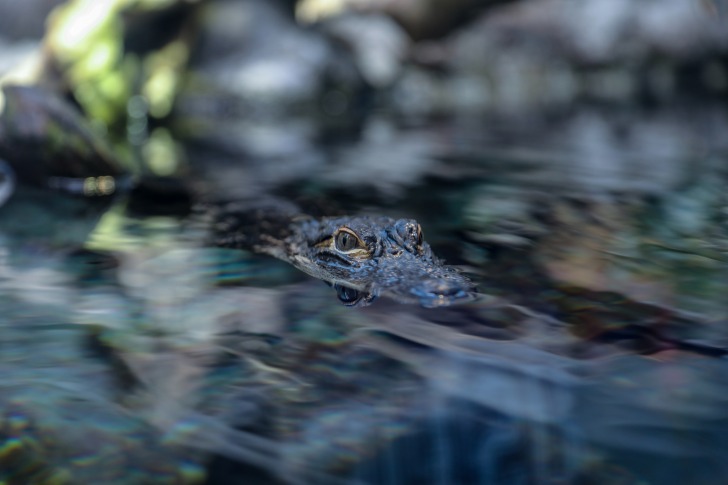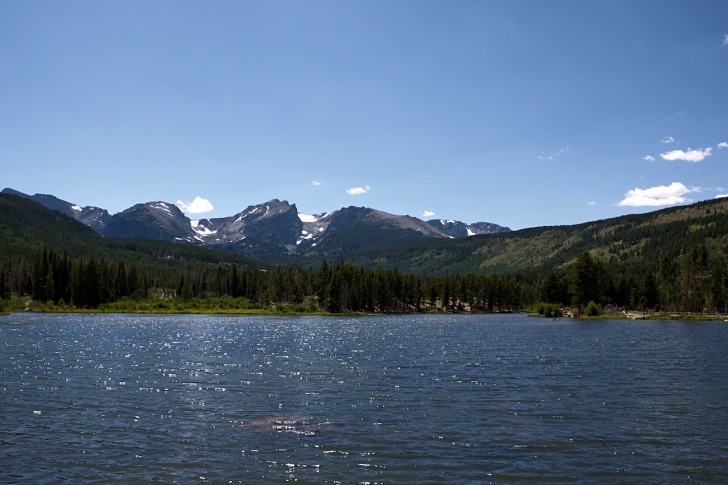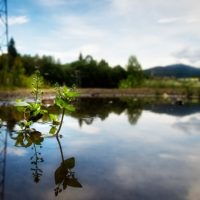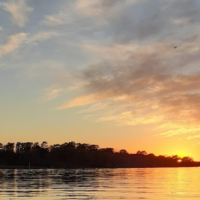Caddo Lake is the largest freshwater lake located in the south of the United States and is located on the border between Texas and Louisiana.
It is a lake and wetland situated on 24,500 acres and is an internationally protected wetland under the RAMSAR treaty.
Summers are hot and muggy in Caddo Lake State Park and winters are cold and wet.
The weather conditions and location make Caddo Lake the ideal habitat for a range of wildlife animals.
Contents
So… Are There Alligators in Caddo Lake?
Caddo Lake is situated in Caddo Lake State Park.
The park is a very well-known tourist attraction due to the various wildlife and activities it offers its visitors.
Caddo Lake is a freshwater bayou and wetland.
One of the reptile species that you will find in Caddo Lake is an alligator.
Freshwater bayous are the ideal habitat for alligators.
Alligators live in the park.
The park offers boat tours for visitors who would like to go sightseeing and get up close to the Gators in the lake.
There are so many alligators in this lake that it has made it onto the list of the most alligator-infested lakes in Texas.
Alligator Species in Caddo Lake
There are only two alligator species left in the world.
The first is the American alligator (Alligator mississippiensis) and the Chinese alligator (Alligator sinensis).
The American alligator is a large reptile that is semi-aquatic.
It is related to the crocodile.
It has an armored body with a muscular, long, flat tail.
The alligator has prominent eyes.
Its nostrils face up and sit on its nose to allow it to breathe while its body is submerged under water.
Alligators can grow to 11 feet in length and some even grow to 1,000 pounds in weight.
The males of this species are notably bigger than the females, who only grow to approximately 8 feet in length.
Alligators are typically black or darker shades of gray with a light underbelly.
The American alligator lives to be between 30 and 50 years old and females often lay clutches of approximately 20 to 50 eggs during the mating season.
The eggs will take approximately two months to hatch.
During this time, the female will guard the eggs.
The natural habitat of the alligator is freshwater ponds, lakes, marshes, swamps, bayous, or slow-moving rivers.
The American alligator can be found in central Texas, across most of North Carolina, Alabama, Louisiana, Florida, and South Carolina.
The American alligator was once put on the endangered species list as it was hunted to near extinction in the mid-1950s.
The gator has made a major comeback since then, but the alligator is still considered to be a protected game animal in the state of Texas.
Alligators are not typically aggressive, but they do become a nuisance when they’ve established their territories around humans.
Alligators are excellent swimmers and can sprint up to 35 miles per hour for very short distances before they get tired.
Is it Safe to Swim in Caddo Lake?
Caddo Lake in Caddo Lake State Park is an ideal camping and tourist destination.
The park offers visitors a plethora of fun and exciting things to do and see.
Visitors can camp in the park or rent a cabin
There are boat tours, fishing, paddling, and hiking opportunities in the park.
The one thing that you cannot really do in the park is swim.
The waters are infested with alligators and not exactly ideal for swimming.
Visitors to the park are advised to avoid the water and the water banks due to the number of alligators in the park.
However, for those that do want to get up close to the alligators, the park offers boat tours that allow visitors to see and experience the alligators in their natural habitat.

Interesting Alligator Facts in Caddo Lake
An interesting fact about alligators in Texas is that they bromate from mid-October to early March.
During this period, they are mostly inactive.
Brumation ends in March and their breeding season starts from the 1st of March through May.
This is the primary time frame for breeding and nesting.
During the breeding season, the females will remain very close to the nest and territory while the males move around in a radius of 10 miles, around the nest.
Nest building is the job of the female alligator. She collects local vegetation to make a nest for her eggs.
The nest is approximately six feet across and a few feet high.
The female gator will typically lay between 35 and 50 eggs in a clutch.
The eggs are roughly three inches long and take approximately two months to hatch.
During this time, you will find the female alligator close to the nest guarding her eggs and nest for the duration of the incubation period.
When her young are hatching, she helps them to break out of their shells.
The next two years are marked by the relationship between the mother and her young.
During this time, the young alligators remain in the care of their mother until they are two years old.
The sex of the alligators is determined by the heat that the eggs have been exposed to.
It is not DNA that determines the sex of the alligator but rather the temperature of the nest.
The warmer the nest, the higher the likelihood that most of the hatchlings will be males, while cooler nests produce females.
Alligators vs. Crocodiles
Though they look near identical, alligators and crocodiles are not the same and there are some key differences between these two reptiles.
It’s rare, but not uncommon that you will find the habitats of alligators and crocodiles overlapping.
Alligators prefer freshwater bodies of water such as ponds, lakes, rivers, marshes, wetlands, bayous, and swamps and can also tolerate brackish water bodies.
Crocodiles live in both freshwater and saltwater bodies.
Alligators are not commonly found in saltwater bodies, but there are some occasions when you may find alligators in saltwater.
The reason that they avoid saltwater is that they do not have salt glands.
The biggest giveaway between these two reptiles is their snouts.
The snout of the alligator is shorter, flat, and U-shaped.
The alligator has a larger upper jaw which overlaps the lower jaw and only allows the upper teeth to be visible when the jaw is closed.
The alligator has 80 teeth in its mouth and may go through 2,000 teeth in its lifetime due to its diet.
It’s carnivorous and some animals may be harder to eat or tear apart, which may cause the gator to lose some of its teeth. But, the missing tooth will soon grow back.
The crocodile, on the other hand, has a longer, V-shaped snout.
It doesn’t have the same overbite and its upper and lower jaw are the same sizes, allowing its teeth to integrate when it closes its jaw.
The crocodile has 66 teeth.
Their color is another clear giveaway.
The alligator is usually very dark gray or black.
It has a lighter underbelly.
The crocodile, on the other hand, is light green or brown.
Crocodiles also tend to outlive alligators by approximately 30 years.
The alligator will live for about 30 to 50 years in the wild, while the crocodile may live to be 70 or even 100 years old.
The last difference is the fact that alligators are not normally aggressive toward humans.
There have been quite a few incidents of alligator attacks on humans across the various states, but these attacks are sometimes provoked or the individual may just be in the wrong place at the wrong time.
Alligators are opportunistic hunters who will lie and wait for their prey to come to them.
They will not actively go out and hunt for food.
The crocodile, however, is known to be quite aggressive toward humans and there have been several attacks to corroborate this statement.
3 Safety Tips for Swiming in Alligator-infested Waters
- Swim only in designated areas – most water bodies that forbid swimming due to high alligator activity will have advisory boards warning visitors not to swim in the water. There may also be advisory boards advising where swimmers should be swimming, as those areas may not have as many or as many active alligators. However, whenever possible, try to avoid swimming in alligator-infested water altogether.
- Do not feed or harass the alligator – this may make you seem like an easy source of food for the alligator. And, when you harass an alligator you are only making it angry, in which case it will most likely attack you.
- Always avoid throwing fish scrapes on the floor or in the water – camping and fishing can be a lot of fun and very exciting. Especially if you are someone that loves to go outside and catch fish. Find a responsible way to get rid of the fish cut-offs. By throwing it on the banks of the water body or in the water, you are inadvertently inviting the alligators over. They will lie in the dark and wait for the next round of humans to show up. This is a recipe for disaster as they could end up attacking other people that visit the same area.
Summary
Caddo Lake is a beautiful place filled with adventure and curiosity.
The lake is home to many alligators.
When visiting Caddo Lake State Park, you may notice that there are a plethora of activities to engage in.
The park is exceptionally well run and the food is amazing.
Visitors will experience alligators up close and learn about the contribution the alligator makes to the ecosystem in the Texas bayou.
Frequently Asked Questions
How do you not get attacked by an alligator?
The best way to avoid an alligator attack is to remain as far as possible away from them.
How do you fend off an alligator in the water?
The best way is to simply avoid any water where you may find alligators.
Alternatively, if you do find yourself in the water with the gator, gauge their eyes out and hit the tip of their snout.
Have there been any alligator attacks in Caddo Lake?
There have been alligator attacks at this location but none that were fatal.












Enjoy observing alligators in their natural habitat.